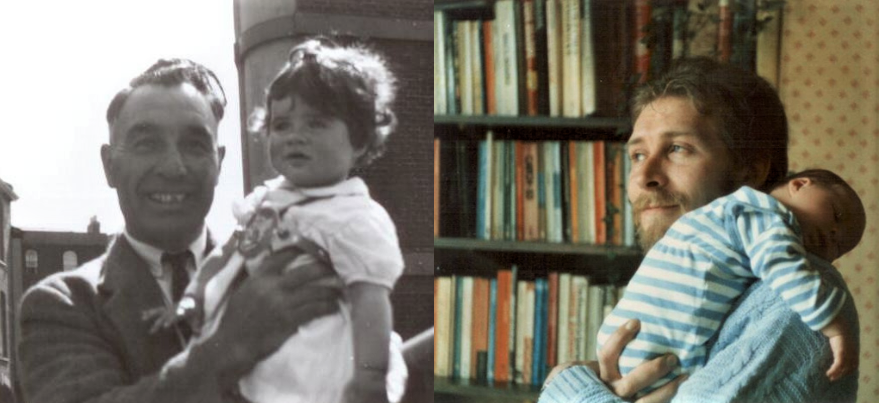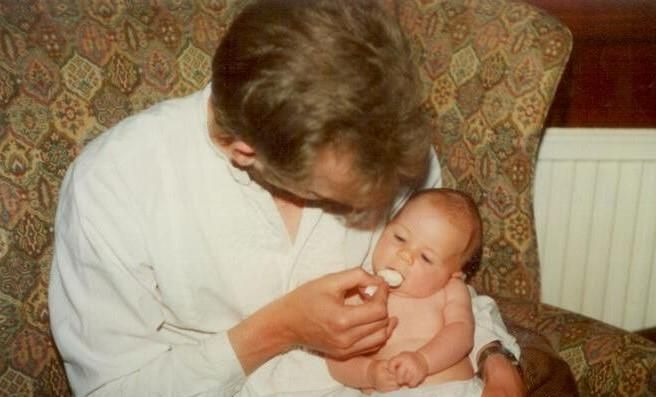Research project
Men, Masculinity and Maternity in Britain, from the 1950s to the Present
- Start date: 1 October 2012
- End date: 30 April 2016
- Funder: University of Leeds Arts Engaged Fellowship
- Primary investigator: Professor Laura King

Description
'They’ve started now believing that fathers should be given the chance to be at the birth’
The second half of the twentieth century saw huge changes in how society perceives the role of fathers in birth and maternity. This research starts in the 1940s, in a period when presence at childbirth was seen as ‘unmanly’. The 1960s and 1970s saw a radical rethinking of gender and masculinity, and in the present day many fathers find themselves in a paradoxical situation where ‘modern’, engaged fatherhood combines and sometimes conflicts with the persistence of breadwinning and work as core ideals of masculinity, and the lack of availability of flexible working for many dads. Whilst some dads are now much more comfortable about changing nappies, parenting labour remains far from equally divided between men and women.
This research fellowship investigated medical literature and the views of medical professionals, as well as oral and family histories to show how fathers are portrayed in popular culture and how men interpret their own experiences of fatherhood. Becoming a father for the first time is crucial part of a man’s life course. Laura King researched men’s decision to start a family and how men have situated the desire to have children within their gendered identities – through pregnancy, fertility issues, antenatal care, childbirth, postnatal care – and then the ways in which men have cared for a newborn and infant, up until their first birthday.

A father and his baby in the 1980s. Image copyright Laura King
What did the research show?
King found that men’s shifting roles in childbirth and early childcare were limited by the persistence of a belief that women’s work in the home was more important than women’s paid work, and that men’s paid work was more important than women’s work. It found that shifts towards men’s greater involvement often came from men and women’s changing behaviour, rather than the external encouragement for men to be more involved, by hospitals, for example. Structural constraints on men’s involvement, such as limited paternity/parental leave, but perhaps more importantly the continued dominance of an association of women with caring motherhood and men with breadwinning had limited progress towards more equal forms of family and parenting.
The impact of this research
In 2014, King delivered a training session for Warwickshire County Council on the history of fatherhood and ways to engage fathers. Many of the attendees said afterwards that they planned to change their practice by ‘looking at what is cultural pressure rather than best for child’, ‘to ensure the father is involved in the process’, and ‘try and engage more fathers’.
In 2015, King co-created a resource pack with West Yorkshire Probation Service, which challenged the idea that men in the past were ‘distant’, and normalised men’s role involvement with children. The probation workers surveyed all agreed or strongly agreed this resource would ‘help to engage and motivate men on supervision in their role as fathers’.
In 2018 this research was used by the House of Commons Women and Equalities Committee and cited in a report on ‘Fathers in the Workplace’ which noted it showed ‘the ideal of a man working full-time to support his family is powerful and long embedded’ and ‘government policy therefore has to overcome rigid social norms about gender roles’. You can read the full report here.
Read more about the impact of King’s work on the history of the family on the REF 2021 case study database, here.
In 2025, King was invited to contribute to a BBC Radio 4 programme called ‘Fatherhood: Is it working?’
Read more about this research
‘How Men Valued Women’s Work: Labour In and Outside the Home in Post-War Britain’, Contemporary European History 28:4 (2019), pp. 454–468. The journal’s website is here (requires institutional logon). Alternatively, you can read an open access version of this article through the White Rose Research Online repository, here.
'Gendered Perspectives on Men's Changing Familial Roles in Postwar England, c.1950-1990', Gender and History 30:1 (2018), pp.70–92 (co-authored with Angela Davis). You can read this article through the journal’s website, here.
‘Hiding in the Pub to Cutting the Cord? Men’s presence at childbirth in Britain c.1940s-2000s’, Social History of Medicine 30:2 (2017), pp. 389–407. You can read this article through the journal’s website, here.

